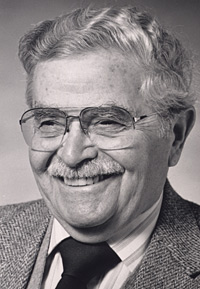UC Berkeley Press Release
Joseph Frisch professor of mechanical engineering and pioneer in computer-aided design, dies at 87
BERKELEY – Joseph Frisch, a professor emeritus of mechanical engineering at the University of California, Berkeley, who was known as a pioneer in computer-aided design, died June 15 at his home in Berkeley after a prolonged illness. He was 87.
 Joseph Frisch |
"Joe Frisch was one of the first researchers, possibly the first, to couple a computer, at the time a very rudimentary digital computer, directly to a machine tool for the development of direct numerical control," said Frisch's former colleague David Dornfeld, a UC Berkeley professor of mechanical engineering. "At that time, he modified a lathe and a milling machine in the Mechanical Engineering Department with step motors and resolvers for position feedback on each axis. He developed a special computer language that he dubbed UC-DNCL, affectionately referred to as 'ockdunkel,' and used the machines to make specially shaped dies for the extrusion of various materials and forming of sheet metal. Frisch had these machines networked before networks existed."
Aside from metal forming, Frisch's research interests also included machine tool design. "He was one of the first to join the North American Manufacturing Research Institute," Dornfeld said. "He had strong interactions with the international manufacturing community well before manufacturing was popular and maintained an active research and professional life."
While at UC Berkeley, Frisch also worked as an adviser to the Atomic Energy Commission, NASA and the aerospace industry, applying his knowledge of design and materials to nuclear energy issues, modern aircraft design and space missions, including America's lunar landings.
From 1972 to 1975, Frisch assumed a leadership role in the College of Engineering as associate dean and committed his tenure to recruiting more women to the college and to the engineering field. In 1973, he was elected a fellow of the American Society of Mechanical Engineers.
Frisch was born on April 21, 1921, in Vienna, Austria. In 1938, he fled the Nazi regime with the help of the Dutch underground and emigrated to the United States in 1940. During the ocean passage, Frisch, a teenager at the time, accompanied six younger Jewish children who were being evacuated to their families in America or who were orphans being sent to the care of the Hebrew Immigrant Aid Society in New York.
Once in the United States, Frisch worked as a mechanic and draftsman to earn money for college. He graduated Phi Beta Kappa from Duke University in 1946 with a B.S. in mechanical engineering and that same year became a U.S. citizen. In 1947, he joined the UC Berkeley faculty as a lecturer in engineering design. In 1950, he earned his M.S. in mechanical engineering from UC Berkeley. A year later, he became an assistant professor in the department and earned full professorship in 1963. When he taught, he drew on his past experience, peppering lectures with commentary about his days as a traditional mechanical engineer.
Frisch was named the A.E. Taylor Professor of Mechanical Engineering at the University of Birmingham, England, in 1970. In 1985, he retired from UC Berkeley.
"He had a strong role in building the Mechanical Engineering Department, a wide range of understanding and experience about the campus, both in engineering and other areas, and was a mentor to me when I was first hired in 1977," Dornfeld recalled.
An engineer with renaissance interests, Frisch painted with watercolors, oils and acrylics, read voraciously, delighted in music from Viennese waltzes to the latest jazz bands and pursued his love of photography. He participated in UC Berkeley's Faculty Humanities Club as its only engineering member.
"He was amazingly well read and curious about everything," said former colleague David Auslander, a UC Berkeley professor emeritus of mechanical engineering. "He was quite an amazing person."
Frisch is survived by his wife, Joan Frisch, of Berkeley; daughter, Teri Sallette-Frisch, of New York and Long Beach, Calif.; son, Erich Frisch, of Berkeley; and son, Jonathan Frisch, of Albany, Calif.
In lieu of flowers, the family requests that donations be made in Frisch's memory to Yad Vashem, P.O.B. 3477, Jerusalem 91034, Israel; the Hebrew Immigrant Aid Society, 333 Seventh Avenue, 16th Floor, New York, NY 10001-5004; or the Mechanical Engineering Scholarship Fund No. 55119, College of Engineering, UC Berkeley, 201 McLaughlin Hall #1722, Berkeley, CA 94720-1722.
A campus memorial is planned for the fall.

